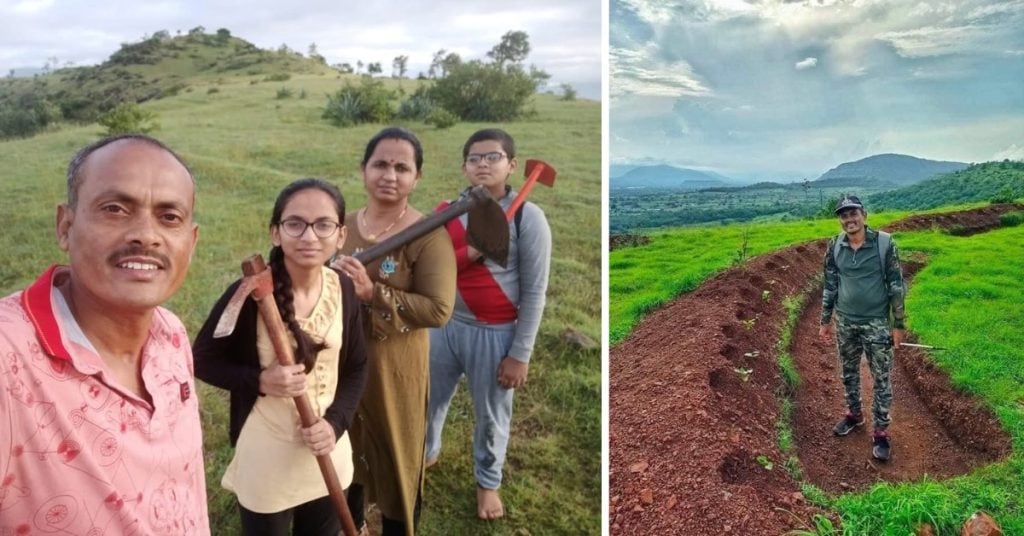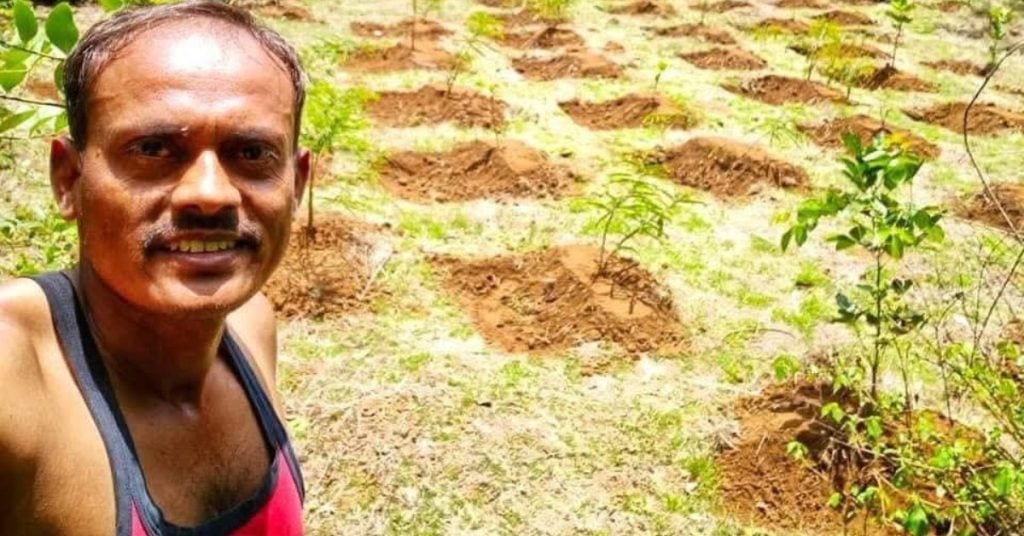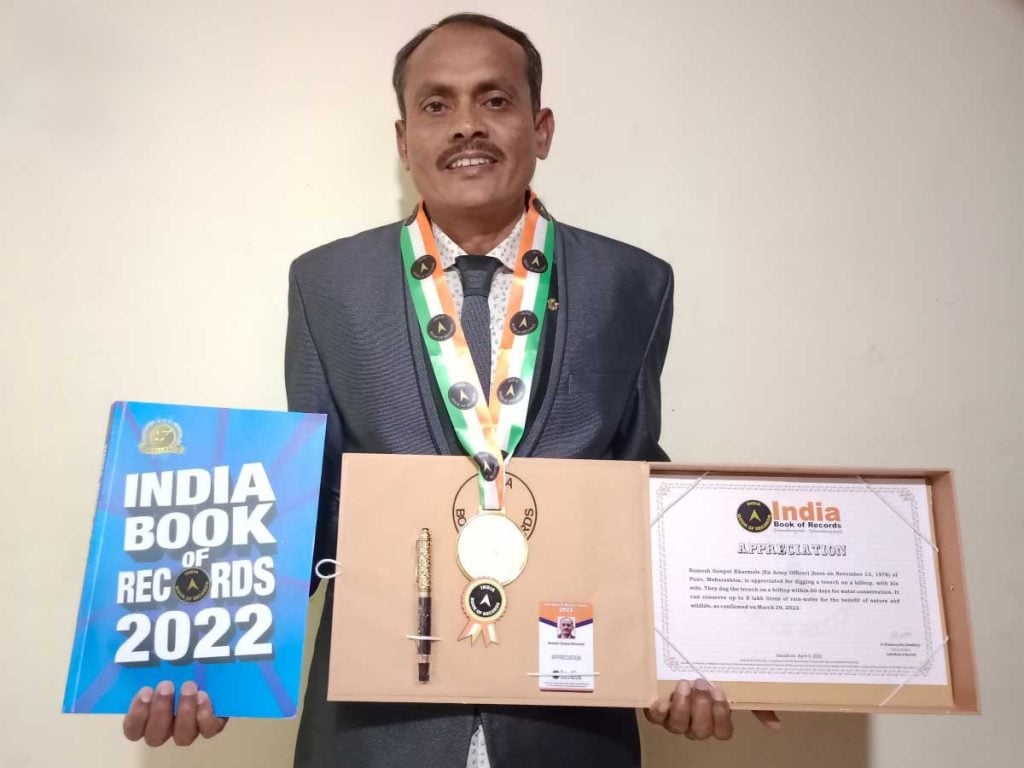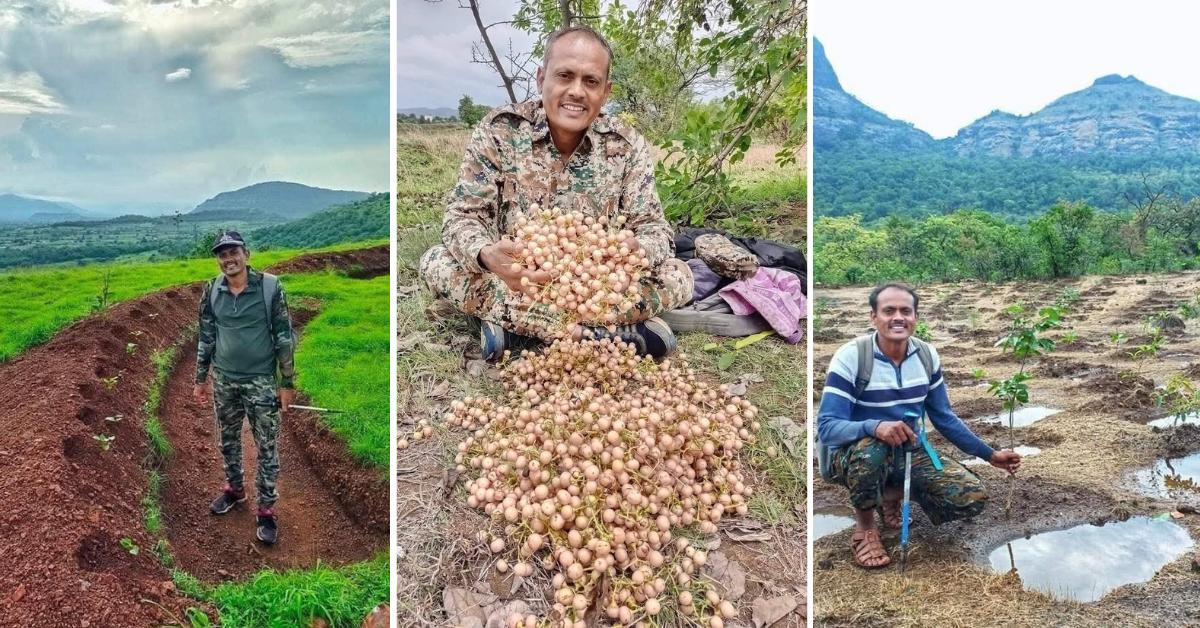In the scenic hills of Junnar in Maharashtra’s Pune district, a former Indian Army jawan is leading a remarkable transformation. Ramesh Ganpat Kharmale, 49, who served for 25 years in the 1st Battalion of the Maratha Light Infantry, is now on a new mission — to revive deforested hills and restore water sources with his family and the Maharashtra Forest Department.
A Soldier’s Journey from Battlefield to Forest Field
After retiring from the Indian Army, Kharmale initially worked at a bank and later started an academy to train tribal youth for police and defence jobs. But his deep concern for his village’s depleting water sources, deforestation, and wildlife loss pulled him toward environmental conservation.
“Both duties I performed are aimed at saving the motherland,” says Kharmale, who credits his military discipline for driving his conservation efforts.
Tree Plantation as Weekend Mission
Kharmale’s mission is not a solo endeavour. His wife Swati, daughter Vaishnavi (20), and son Mayuresh (13) are active participants. Every weekend, the family climbs the sun-scorched hills of Junnar, carrying tools, saplings, and seedballs.
Together, they plant trees, dig trenches, clear weeds, and work to combat soil erosion, wildfires, and water scarcity.
“Seeing our trees grow gives us immense satisfaction,” says Swati, echoing the family’s shared passion.

Dhamankhel Hill: From Barren Slopes to Green Canopy
The turning point came in 2021, when Kharmale began work on Dhamankhel Hill. Over two months, he carved 70 contour trenches, totalling 412 meters, by hand. These now hold up to 8 lakh litres of rainwater, recharging groundwater and preventing erosion.
So far, over 450 trees have been planted on the hill, with plans to plant 500 more. The hill is now slowly turning into a self-sustaining ecosystem teeming with birds, insects, and native flora.

Creating an Oxygen Park for Local Biodiversity
In Vadaj village, 3 km from Dhamankhel, the Kharmale family developed an Oxygen Park on 1.5 acres. Built in collaboration with the Malhar Foundation, this park now hosts 175 native trees like banyan, lemon, and Dalbergia sissoo.
The project used a community model: donors contributed directly to nurseries, and trenches were dug to support growth. The family even dug four small ponds to support wildlife.

Contour Trenching: A Proven Water Conservation Model
Kharmale employs scientific trenching methods, following the land’s natural contours. This technique, also used in parts of Telangana and Karnataka, helps trap rainwater, reduce surface runoff, and boost groundwater levels.
Local farmers confirm that well levels have risen since Kharmale’s interventions began. The model is now being considered for replication in other villages.

Joining the Forest Department
Kharmale formalized his environmental role by joining the Maharashtra Forest Department as a forest guard. However, his weekend efforts are entirely self-funded and voluntary.
“He is one of our most dedicated staff members,” says Pradip Chavan, Junnar Range Forest Officer.
He invests ₹15,000–₹20,000 per month from his salary to buy saplings, seeds, and equipment.

National Recognition
Kharmale’s efforts received national attention on June 30, 2025, when Prime Minister Narendra Modi highlighted his work in the 123rd episode of ‘Mann Ki Baat’.
“Ramesh Kharmale goes to the hills of Junnar with his family… digs trenches, plants trees, and brings back birds and wildlife,” said PM Modi, praising the model of grassroots conservation.
Earlier, Kharmale also received the Shivneri Bhushan Award for community service and sustainable tourism promotion.

From Seedballs to Plastic-Free Hills
Since 2013, the family has been climbing Sahyadri hills every June to disperse seedballs before monsoon onset — helping regenerate forests.
They’ve also launched a plastic-free campaign in Junnar’s tourist spots, supported by thousands of volunteers and schoolchildren.
Kharmale bought a grass-cutter machine in 2017 to prevent wildfires — a major cause of forest loss in the region.

Self-Sustaining, Volunteer-Driven Green Movement
Remarkably, the Kharmales do not accept external donations. Their conservation work is powered by discipline, community engagement, and personal sacrifice.
Their daily schedule starts at 5:30 a.m. with plantation and water management, followed by official forest duties, and resumes again after 5 p.m.
Their Facebook page, ‘Nisargaramya Junnar Taluka’, now has 50,000+ followers, spreading awareness and attracting more volunteers.
Conclusion
Kharmale proves that patriotism doesn’t end at retirement. His military discipline, strategic planning, and leadership have redefined what it means to serve the nation.
“Plant four trees for your children’s future,” he says — a message now echoed across Maharashtra and beyond.
From the battlefield to the barren hilltop, Ramesh Kharmale’s transformation is a story of hope, service, and environmental courage. With the support of his family and a growing community of volunteers, he is proving that one soldier, one family, and one mission can heal the land — one tree at a time.













